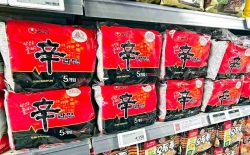14:21 JST, February 25, 2022
The United States and its allies, including Japan, are considering the creation of a multilateral framework to regulate the export of advanced technology, with China in mind.
There have been reports about China using such technology, including artificial intelligence and facial recognition, to continue its repression of Uighurs and other ethnic minorities in the Xinjiang Uygur Autonomous Region.
There have also been allegations that the Chinese government is pursuing policies to apply such private-sector technology to boost China’s military capabilities.
Thus, the United States is expected to invite like-minded democracies such as Britain and Canada to build the framework with Japan, Australia and India, the other members of the Quad.
Amid these circumstances, Beijing claims that Washington has been sowing confusion and division in the world order based on a “Cold War mentality.” Li Chijiang, vice president and secretary general of the China Arms Control and Disarmament Association, contributed the following article that is aligned with the arguments of the government of China. The views and opinions expressed are solely those of the author and do not represent in any way the position of The Japan News or The Yomiuri Shimbun.
Exclusive export control clubs are recipes for disaster
By Li Chijiang / Vice President & Secretary General, China Arms Control and Disarmament Association
For a couple of years, countries around the world have struggled with shortages from cars to computers and the ensuing inflation due to supply crunch of semiconductors, industrial goods and so on. The pandemic is a culprit, but the impact of man-made restrictions on the transfer of goods and technologies can’t be ignored.
At the same time, instead of cooperating to ease the pains inflicted by the pandemic, some countries, countries with the strongest tech sectors and capabilities to do so, are busy forming exclusive clubs to limit the transfer of technologies the world badly needs to recover. As reported by The Yomiuri Shimbun, the Japanese and U.S. governments are considering creating a framework to regulate the export of technologies and equipment in semiconductors, AI, quantum cryptography, etc. The two countries also want to cooperate with like-minded countries in Europe and block exports of such technology to certain countries.
And that’s not all. Not long ago the U.S. and three other countries issued a joint statement on export controls with an aim to restrict the export of advanced technologies that could be used, in their imagination, for “human rights violations.” And the U.S. has been mobilizing the G7, Quad and other alliances to build various export control arrangements focusing on advanced and emerging technologies.
Given the politically charged dynamics in recent years in the area of export control, it is no surprise to see these moves. But for people with the right mind, it’s hard to appreciate the logic behind it, as such kind of exclusive export control small clubs are a resurrection of a Cold War practice that is outdated, ineffective and self-defeating.
First, it goes against the spirit of multilateralism and erodes the foundation of existing export control regimes. Over the past decades, four major export control regimes have been established, i.e. the Nuclear Suppliers Group, the Missile Technology Control Regime, the Wassenaar Arrangement and the Australia Group, to prevent proliferation of weapons of mass destruction and their means of delivery. Though falling short in terms of broad representation, these regimes have been useful in coordinating export control policies among participating countries and contributed to non-proliferation and international security.
However, in recent years, certain countries, acting out of narrow self-interests and with great power competition in mind, have tried to hijack these regimes to serve their unilateral and geopolitical purposes, pushing for regimes like the Wassenaar Arrangement to tighten controls on items essential to their high-tech hegemony and stall progress of potential competitors. On the other hand, these countries have undermined the very regimes they built. In 2020, the U.S. allowed the sale of advanced armed drones to its allies despite clauses in the MTCR that limit such transfers. And it was exactly the U.S. that urged other nations to limit exports of advanced drones in the first place.
Perhaps because the practice of launching politically motivated control measures at these regimes is unpopular even among their members, these countries resort to forming smaller export control clubs with fewer members. In so doing, they are taking off the velvet glove of claimed multilateralism and acting purely out of the desire for dominance and hegemony. If this goes on, the world will be left with a bunch of geopolitics-driven, target-specific ad hoc export control partnerships but no functioning export control regimes.
Second, it creates division and confrontation at the cost of scientific and technological progress of the whole world. Taking other countries as imaginary enemies and imposing export controls in the name of human rights, non-proliferation or national security may sound noble, but the fact is, this only enables a small number of technology “haves” to flaunt export control tools on technology “have-nots” and punish countries they don’t like. As a result, global supply chains will be disrupted, a wide spectrum of industries will suffer unnecessarily, and scientific and technological progress on the basis of exchanges and cooperation will be undermined. The legitimate right of all countries to utilize science and technology for peaceful purposes and achieve sustainable development will be severely violated.
Third, such a practice leads nowhere and is self-defeating. During the Cold War, the U.S. initiated and led the CoCom to coordinate export controls policies towards countries they don’t like. However, countries at the receiving end managed to develop their industrial and tech sectors anyway. Some even grew into leaders in many fields. Take China, for example. Long a major target of various kinds of export control restrictions, China has developed into the only country with all the industrial categories listed in the United Nations industrial classification. China is also the largest market for a wide range of high-tech products and technologies. It imports over $300 billion in semiconductors annually, mostly from the U.S. and Japan. On the other hand, abusive export controls cost dearly for exporters. In some cases, entire supply chains in supplier countries risk being disrupted due to excessive export restrictions.
Establishing exclusive export control clubs is no answer to the problems facing today’s deeply interconnected world. Rather, they are recipes for disaster. The world doesn’t need more export control elites’ clubs driven by Cold War mentality and ideological biases, which practice power politics and self-serving abusive policies and pursue the interests of some countries at the cost of others. What the world needs are balanced, inclusive, transparent and impartial multilateral export control arrangements that truly practice multilateralism.
To erect walls or to build bridges? This question has too often been laid out in front of today’s world. The Cold War was over two decades ago. People around the world deserve a better future. All it takes to make the right choice is the courage to speak truth to power.
Top Articles in World
-

Israeli Ambassador to Japan Speaks about Japan’s Role in the Reconstruction of Gaza
-

Videos Plagiarized, Reposted with False Subtitles Claiming ‘Ryukyu Belongs to China’; Anti-China False Information Also Posted in Japan
-

North Korea Possibly Launches Ballistic Missile
-

Chinese Embassy in Japan Reiterates Call for Chinese People to Refrain from Traveling to Japan; Call Comes in Wake of ¥400 Mil. Robbery
-

Russia: Visa Required for Visiting Graves in Northern Territories, Lifting of Sanctions Also Necessary
JN ACCESS RANKING
-

Japan PM Takaichi’s Cabinet Resigns en Masse
-

Japan Institute to Use Domestic Commercial Optical Lattice Clock to Set Japan Standard Time
-

Israeli Ambassador to Japan Speaks about Japan’s Role in the Reconstruction of Gaza
-

Man Infected with Measles Reportedly Dined at Restaurant in Tokyo Station
-

Videos Plagiarized, Reposted with False Subtitles Claiming ‘Ryukyu Belongs to China’; Anti-China False Information Also Posted in Japan





















